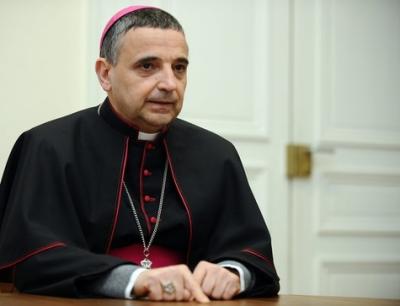Fr. Hamel death is not a "call to combat" says archbishop

PERUGIA -- The archbishop of Rouen, Dominique Lebrun, attended the “Thirst for Peace” meeting in Assisi running until Tuesday, and spoke to the gathering commemorating the recently assassinated priest Fr. Jacques Hamel about what should be taken from his “martyrdom,” Sant’Egidio sources said Monday.
At the meeting, “Thirst for Peace,” organized by the Sant’Egidio community, the diocese of Assissi and the Franciscan Family, the archbishop of Rouen, Dominique Lebrun, commemorates the martyred Fr. Jacques Hamel.
“Providence leads me to Assisi a few weeks after the assassination of Fr. Jacques Hamel at the end of his mass, by the hands of two youngsters who proclaim themselves to be of Islamic faith,” Lebrun said.
“I wish to ask for the grace of continuing on the path of dialogue, a dialogue that is stronger, truer, more internal,” said the archbishop.
Lebrun hoped that the assassination of the priest “would not be taken as the sign of a raised flag for combat and condemnation, but instead as the joy of giving thanks for the gift of a priest that gave his life like Christ.”
For those who ask themselves if cohabitation could be an illusion, in reply the archbishop said that “in social and familial life, all aspects of our religions are compatible.”
He continued by recalling the visits of many Muslims to “our Sunday gatherings June 31,” as expressions of “a family that pay a visit to another family in mourning. This is a good deed. We all belong to the same human family.”
In the same international gathering of religions at Assisi, Mohammad Sammak, the political advisor to Libya’s Grand Mufti, praised Pope Francis by saying that the head of the Holy See “assumed the position of a spiritual leader for all humanity when he said that there is not criminal religion, but that there are criminals in all religions.”
Sammak denounced ISIS as a “group of vengeful, desperate extremists that have diverted Islam,” also referring to the late Fr. Jacques Hamel as “a victim not only for your church, but also for our religion.”
He concluded his speech with an implicit reference to his homeland of Libya, saying that “the relationships between people of different religions cannot be based on the elimination of the other -- as ISIS would like -- or even just on tolerance. They should be based on faith in pluralism and on diversity, and on respect for the ideological and intellectual foundations which are the pillars of diversity.”
nkd


